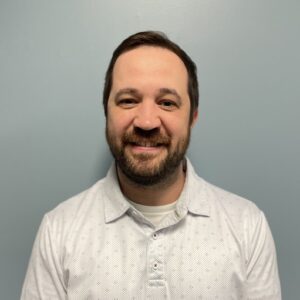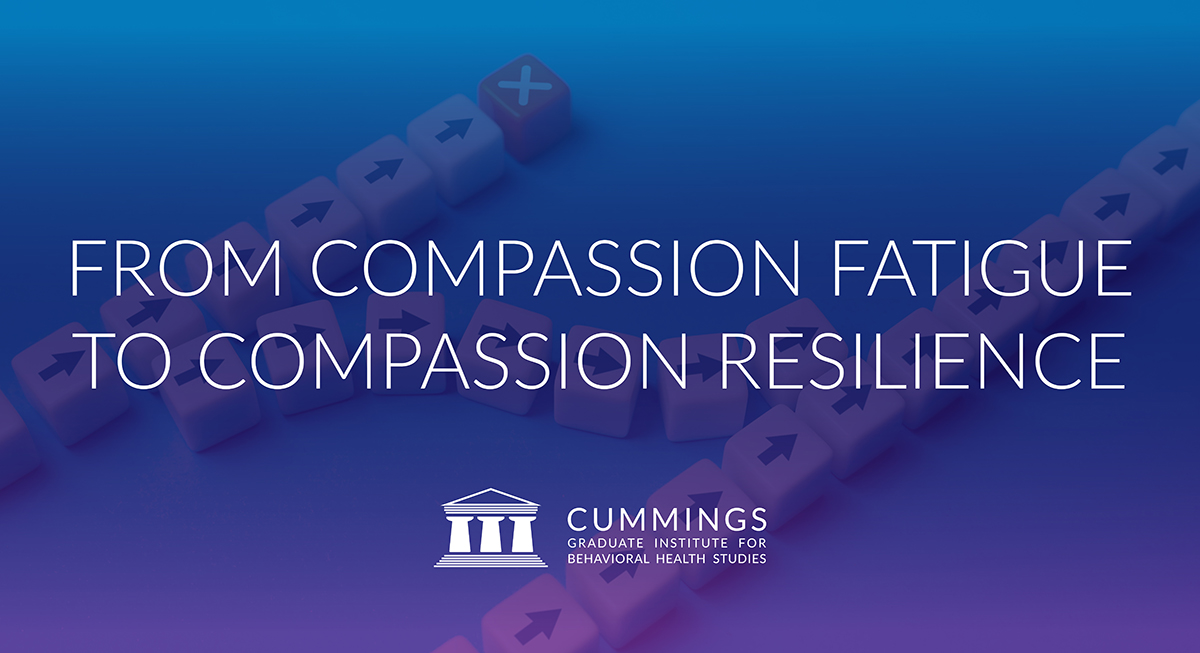New Podcast Episode Reframes Self-Care as a Professional Responsibility
In the latest episode of Disruptors at Work: An Integrated Care Podcast, guest host Dr. Cory Cannady, Cummings Graduate Institute for Behavioral Health Studies (CGI) Doctor of Behavioral Health (DBH) alumnus, leads an engaging discussion on the importance of self-care for behavioral health professionals. He is joined by fellow DBH program alumni, Dr. Pauline T. Pablo, Co-owner and Executive Clinical Director at Symphony Behavioral Health and Dr. Jeremy Henderson-Teelucksingh, Principal at Indigo Path Collective; and Dr. Gayle Cordes, Faculty Associate at CGI. Drawing from their extensive expertise, the guests share strategies for managing the emotional demands of the profession, setting healthy boundaries while providing compassionate care, and incorporating self-care practices that improve both personal well-being and patient outcomes. The conversation also addresses common challenges in maintaining self-care, methods to combat emotional exhaustion, and practical advice for professionals committed to sustaining their health while making a positive impact in the field.
Thank you to our subject matter experts:
-
-
- Dr. Cory Cannady, DBH, BCBA, LBA, IBA
- Dr. Jeremy Henderson-Teelucksingh, DBH, LPC/MHSP, LCMHC, NCC, CCMHC
- Dr. Pauline T. Pablo, DBH, BCBA, IBA
- Dr. Gayle Cordes, DBH, MBA, MC
-
About the Subject Matter Experts:
Dr. Cory Cannady, DBH, BCBA, LBA, IBA

Dr. Cory Cannady, CGI DBH program alumnus, is a Board Certified Behavior Analyst and the Assistant Clinical Director at Elevate. He is from a small town in west Tennessee and moved to Chattanooga in 2009 to attend UTC. After earning his Bachelor’s in Secondary English Education, he taught for the Hamilton County Department of Education for 5 years. While teaching, he obtained his Master’s Degree in Applied Behavioral Analysis from the University of Cincinnati in 2017. He obtained his Board Certification and licensure in 2019. Cory has recently completed his Doctor of Behavioral Health degree from Cummings Graduate Institute for Behavioral Health Studies.
Dr. Jeremy Henderson-Teelucksingh, DBH, LPC/MHSP, LCMHC, NCC, CCMHC

Dr. Jeremy Henderson-Teelucksing, CGI DBH program alum, is a counselor, leadership and management coach, and corporate and community human relations consultant. As a counselor, Jeremy works with adults (individuals, couples, and families) who experience PTSD/trauma, abuse in the context of family relationships, anger, obsessive-compulsive disorder, anxiety, relationship issues, and more. Jeremy also works with the LGBTGEQIAP+ community (teens and adults) and is an “out” counselor with a history of diversity, equality, inclusion, and belonging advocacy. Jeremy approaches counseling from a multicultural and social justice viewpoint and has lived and worked in many US states and countries, which Jeremy draws from to understand the client’s unique experience.
Dr. Pauline T. Pablo, DBH, BCBA, IBA

Dr. Pauline Tolentino Pablo, CGI DBH program alumna, is a trauma-informed Doctor of Behavioral Health, Board Certified Behavior Analyst, mother, wife, and healthcare advocate. She holds a Bachelor of Arts degree in Psychology and a Master of Arts degree in Teaching with a specialization in Applied Behavior Analysis. Her work as a behavior analyst focuses on providing behavioral support services to neurodiverse individuals diagnosed with various developmental disabilities. Dr. Pablo co-owns and operates Symphony Behavioral Health Inc., a neurodiversity affirming ABA company serving the southern California region. She is also the co-founder of Asian Pacific Islanders Association for Behavior Analysis (APIABA), a non-profit organization that aims to disseminate the science of ABA within the Asian and Pacific Islander population, as well as promote diversity within the field to better serve diverse populations.
Instagram: @api.behavioranalysis
Dr. Gayle Cordes, DBH, MBA, MC

Dr. Gayle Cordes, for nearly twenty years, was a state-licensed psychotherapist and owner of an independent practice in Arizona, with specialty training and advanced certifications in trauma treatment therapies, including eye movement desensitization and reprocessing (EMDR). Along with her work in private practice, she served on staff at the 2012 launch of the University of Arizona Integrative Health Center in Phoenix, associated with Dr. Andrew Weil and the Arizona Center for Integrative Medicine, where she conducted an unpublished, retrospective study on the treatment effects of EMDR therapy on co-occurring anxiety and chronic medical conditions. Since 2018, she has served on an EMDRIA Board task force charged with drafting guidelines for the delivery of EMDR therapy virtually as well as training therapists in EMDR therapy through distance learning. In 2022, that initiative developed into the inaugural EMDRIA Training Council, upon which she served as a member of the steering committee. Prior to her career in psychotherapy, as an MBA, she spent 25 years in the corporate sector; in the later years of that chapter, she served within the executive ranks of a Fortune 500 company. Since 2016, she has served on the graduate faculty of Cummings Institute for Behavioral Health Studies, where she developed a trauma specialty curriculum for the Doctor of Behavioral Health degree program.






























